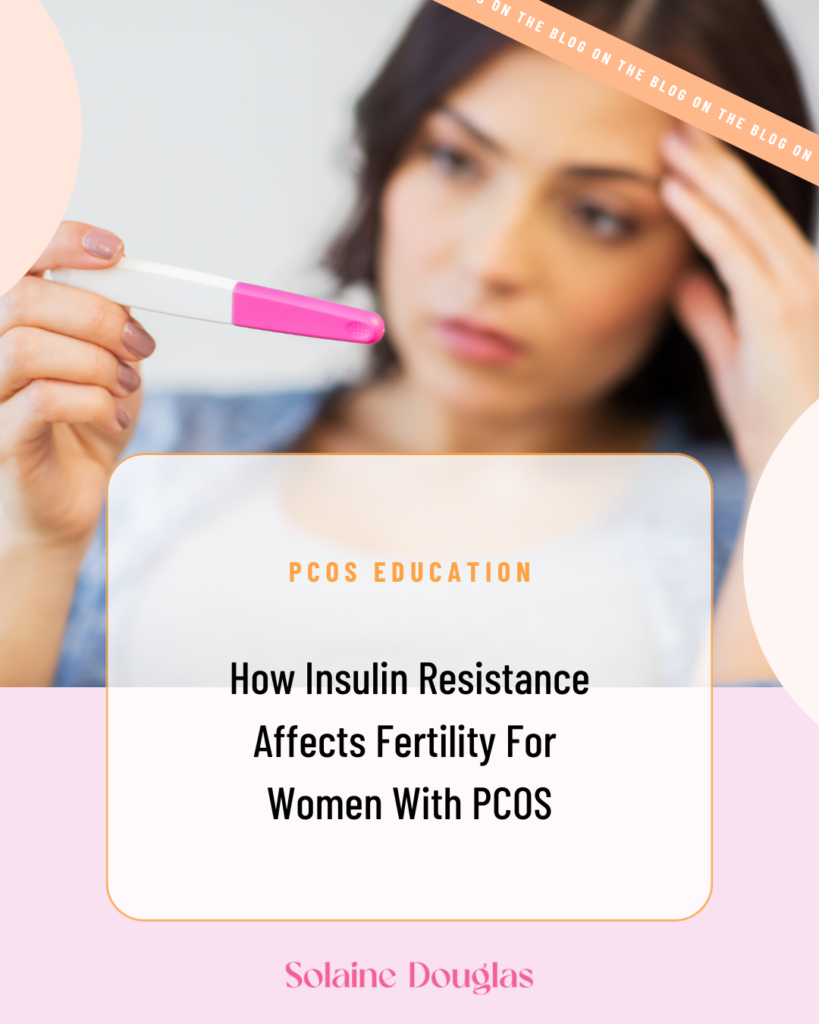PCOS & Fertility: How Insulin Resistance Impacts Reproductive Health
March 6, 2025

Understand How Insulin Impacts Fertility in PCOS
Insulin resistance is a core driver of many PCOS-related symptoms, including difficulty with weight management, acne, and excessive hair growth. However, its impact on fertility is often overlooked. Research clearly shows that insulin resistance negatively affects egg quality, embryo development, implantation rates, and increases the risk of miscarriage. Whether you are trying to conceive naturally or undergoing assisted reproductive technologies like IVF, improving insulin resistance can significantly enhance fertility outcomes.
How Insulin Resistance Impacts Reproductive Health
1. Egg Quality and Ovulation
Insulin resistance leads to chronically high insulin levels, which disrupt ovarian function. High insulin levels can increase the production of androgens (male hormones) in the ovaries, leading to irregular or absent ovulation. Additionally, insulin resistance has been linked to poorer oocyte (egg) quality, reducing the chances of successful fertilisation and embryo development.
2. Embryo Development and Implantation
Studies show that elevated insulin levels alter the endometrial environment, making it less receptive to embryo implantation. Research also suggests that insulin resistance negatively impacts mitochondrial function within eggs, reducing their ability to develop into healthy embryos.
3. Increased Risk of Miscarriage
Women with insulin resistance have a higher risk of miscarriage due to the poor quality of oocytes and impaired endometrial receptivity. A study published in Human Reproduction found that women with PCOS who had insulin resistance were at an increased risk of early pregnancy loss compared to those without insulin resistance.
4. Higher Risk of Gestational Diabetes
Even if conception is successful, insulin resistance significantly increases the risk of gestational diabetes. This condition can lead to pregnancy complications such as pre-eclampsia, premature birth, and larger-than-average birth weight for the baby, which can make delivery more challenging.
How to Improve Insulin Resistance for Better Fertility Outcomes
The good news is that insulin resistance is reversible through targeted lifestyle changes. Here are some evidence-backed strategies to improve insulin sensitivity and enhance fertility:
- Balanced Macros: Prioritising protein, healthy fats, and fibre with each meal helps stabilise blood sugar levels and reduce insulin spikes.
- Regular Movement: Moderate exercise, especially resistance training, improves insulin sensitivity and supports hormonal balance.
- Inositol Supplementation: Research suggests that myo-inositol can enhance insulin sensitivity and improve ovulatory function in women with PCOS.
- Managing Stress & Sleep: Chronic stress and poor sleep can exacerbate insulin resistance by increasing cortisol and inflammation levels. Prioritising restorative sleep and stress-reduction techniques is crucial.
Final Thoughts
Reversing insulin resistance not only increases your chances of conception but also leads to a healthier pregnancy with a reduced risk of gestational diabetes. Whether you’re trying to conceive naturally or through assisted reproductive technology, focusing on insulin management is one of the most powerful ways to improve fertility outcomes and support long-term metabolic health.
References
1. Dumesic, D. A., Meldrum, D. R., Katz-Jaffe, M. G., Krisher, R. L., & Schoolcraft, W. B. (2015). Oocyte environment: Follicular fluid and cumulus cells are vital to oocyte health. Molecular Human Reproduction, 21(1), 23–37. https://doi.org/10.1093/molehr/gau064
2. Carr, M. C. (2003). The emergence of the metabolic syndrome with menopause. The Journal of Clinical Endocrinology & Metabolism, 88(6), 2404–2411. https://doi.org/10.1210/jc.2002-021480
3. Palomba, S., Santagni, S., Falbo, A., & La Sala, G. B. (2018). Complications and challenges associated with polycystic ovary syndrome and pregnancy: Current scientific evidence and clinical implications. In L. R. Pasquali & A. E. Genazzani (Eds.), Endocrinology of the ovary (pp. 123–145). Springer. https://doi.org/10.1007/978-3-319-45534-1

